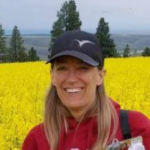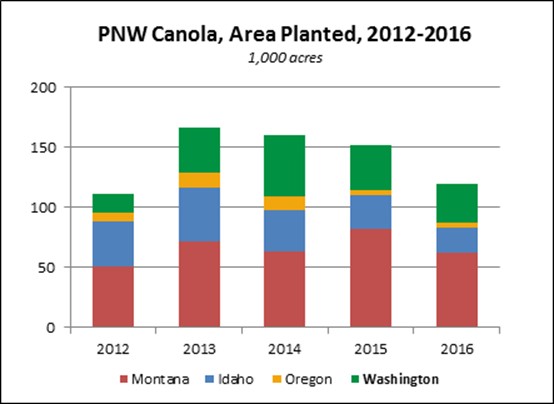 Not long after joining the Washington Oilseed Cropping Systems (WOCS) project at Washington State University 10 years ago, I had the good fortune of meeting a farmer in eastern Washington who had been growing canola for more than 20 years. This farmer told me about an effort in the mid-90s – when production was finally gaining some steam – to create a Pacific Northwest (PNW) canola and rapeseed association. However, that effort ‘faded away’after several years. The idea resurfaced five years ago, but again, did not go anywhere. All the while, acreage in the PNW continued an upward trend.
Not long after joining the Washington Oilseed Cropping Systems (WOCS) project at Washington State University 10 years ago, I had the good fortune of meeting a farmer in eastern Washington who had been growing canola for more than 20 years. This farmer told me about an effort in the mid-90s – when production was finally gaining some steam – to create a Pacific Northwest (PNW) canola and rapeseed association. However, that effort ‘faded away’after several years. The idea resurfaced five years ago, but again, did not go anywhere. All the while, acreage in the PNW continued an upward trend.
With that kind of history, will there ever be a ‘right’ time to form an association in the PNW and will it ever be needed? Yes and I say now is the time; the importance cannot be overstated.
Wheat acreage in Idaho, Montana, Oregon and Washington regularly tops more than 10 million acres. On the other hand, canola acreage in the four states peaked most recently in 2013 at 166,000 acres, with a five-year average of 141,000 acres (see chart). At a modest 20 percent adoption rate of canola, the canola acreage would jump to 2 million acres. That’s a significant opportunity for the expansion of winter and spring canola acreage along with improved production conditions for other crops in rotation.
There’s also an increasing demand for fuel and food oil. This is bringing in major commitments to sustain local oil processing facilities in the region.
In an area long dominated by cereal rotations, these factors – along with a steady dose of research, field tours, and workshops – are driving a momentum shift towards acceptance of canola as a viable rotation crop.
Obviously, a regional grower association would strengthen ties between producers, industry and governmental agencies in the four states. But it could also bring in additional funding for canola research and extension, lobby for policies and provide a voice in D.C. on behalf of PNW canola growers. I have communicated with leaders and board members of the Northern Canola Growers Association, Great Plains Canola Association and Willamette Valley Oilseed Producers Associations. All have spoken passionately about the benefits of having groups in their respective regions.

The interest level in canola has never been higher and the potential for near-term and long-term acreage growth is here. A PNW Canola Grower Association is a natural addition to this region that will support and further the canola industry – from growers all the way to consumers. The time is right.
Karen Sowers is an extension and outreach specialist for oilseeds in the department of crop and soil sciences at Washington State University.